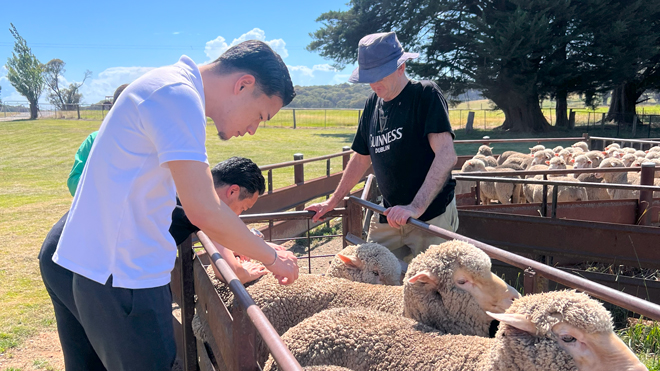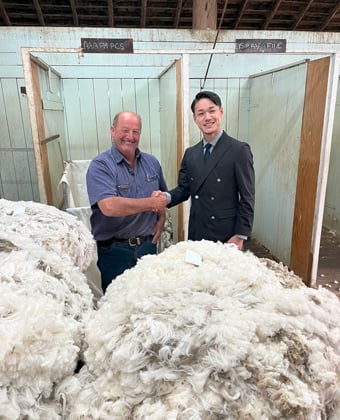Japanese Toyoshima’s Aussie wool journey

AWI works closely with large Japanese trading house Toyoshima to help build the demand for Australian wool. The company recently visited Australia with the aim to source wool from specific properties and build its traceability credentials.
Founded in 1841, Toyoshima is a Japanese trading house handling various textile products including wool, with annual sales worth A$2.2 billion.
The amount of raw materials and yarn that Toyoshima handles is amongst the highest in Japan. The trading house handles both worsted and woollen yarns, and handles the largest amount of worsted yarn in Japan.
It supplies yarn to Japanese weavers and knitters for a variety of uses, not only for general apparel, but also for military, police and school uniforms. Toyoshima also trades in other wool products including wool tops.
Toyoshima visit to Australia
In March, Mr Junya Nakai of Toyoshima, who is in charge of the company’s greasy wool and wool tops business, visited Australia from Japan to visit several wool-growing properties.
Mr Nakai was introduced by AWI to Tasmanian wool broker Wool Solutions. He spent two days in the state to meet with the Wool Solutions team and visit several properties to learn more about the wool supply chain. The properties visited were: Jack Cotton’s ‘Kelvedon’ near Swansea, John and Isobel Taylor’s ‘Winton’ at Campbell Town, Will and Nina Bennett’s ‘Ashby’ at Ross, and Antony Gunn’s ‘Forton’ at Powranna.

Woolgrower Jack Cotton of ‘Kelvedon’ near Swansea in Tasmania welcoming Mr Junya Nakai of Toyoshima.
“Toyoshima is interested in undertaking a single origin or single region traceability project involving the purchase of Tasmanian wool in the near future. Wool-growing in Tasmania has a great history and can provide a compelling provenance story,” Mr Nakai said.
“People in the industry in Japan have a good image of Tasmania, and I think Australia as a whole has a very strong relationship with Japan and Japanese people.
“Australian wool is well regarded as the major supplier of high-quality wool to countries all across the world and it is expected that Australia will continue to produce a stable supply of high quality raw materials in the future. This is very important. Traceability is becoming an important issue for consumers, and brands and suppliers are responding to this demand for transparency of origin.”
During his trip, Mr Nakai visited the AWI office in Sydney to meet to with AWI staff. He was also accompanied on visits to the Sydney Wool Selling Centre at Yenorra and Lindner Quality Socks in Crookwell, as well as two NSW wool-growing properties: Tony and Natalie Hewitt’s ‘Galmara’ at Grabben Gullen, and Anthony and Kristen Frost’s ‘Thalabah’ at Laggan.
Building demand for Australian wool
Mr Nakai says he welcomed the energy and positivity for the wool industry he experienced during his visit to Australia.
“I hope to build on this energy when I return to Japan. Toyoshima already has regular meetings with AWI subsidiary The Woolmark Company, and we hope that we can continue to promote wool materials and sales activities, and thereby contribute to the development of the wool industry,” he said.
“The Woolmark Company has helped us a lot and already introduced us to a number of domestic and overseas brands and factories, including in Korea and Vietnam, and new business opportunities and product developments are increasing.
“Furthermore, natural fibres are making a comeback with consumers which will benefit the demand for wool. If we are able to educate the younger generations in Japan about the natural and environmental benefits of wool, and increase this awareness to the same level as in Western countries, the use of wool will increase.”
This article appeared in the June 2024 edition of AWI’s Beyond the Bale magazine. Reproduction of the article is encouraged.












